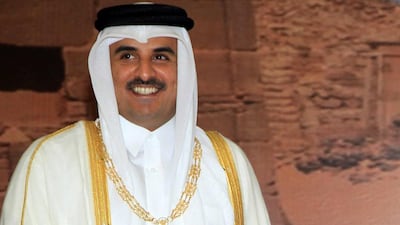NEW YORK // Qatar’s role in securing the release of a US hostage in Syria comes as the Gulf country increases its efforts to counter accusations that it supports Islamist militants.
Qatar’s foreign ministry said it had “succeeded in releasing American journalist Peter Theo Curtis” after he was abducted nearly two years ago by Syrian Islamist rebels and held by Al Qaeda’s affiliate there, Jabhat Al Nusra.
“Qatar exerted relentless efforts to release the American journalist, out of Qatar’s belief in the principles of humanity and its keenness on the lives of individuals and their right to freedom and dignity,” the ministry said on Sunday.
The emirate has negotiated the release of other western hostages from Islamist groups in recent years, including a deal in May to free Taliban detainees from Guantanamo Bay in exchange for a US prisoner of war.
Doha also worked with the Lebanese government in March to convince Al Nusra to free a group of Syrian nuns.
Qatar has leverage with Al Nusra, which has been designated as a terror group by the US, and other hardline Islamist rebel factions in Syria because of the military and financial aid Doha provided to many of these groups.
Qatar is reported to have cut off much of this assistance after demands by Washington. Yet, Qatar’s history in Syria and close ties to Islamist political and militant groups across the Muslim world has left Doha vulnerable to a chorus of accusations that it directly or indirectly funds the Islamic State, the militant group that has taken control of swathes of Syria and Iraq, killing thousands.
Despite Qatar being one of the first Arab countries to publicly condemn the Islamic State’s beheading of James Foley, Germany’s development minister, Gerd Mueller, said on Wednesday: “Who is financing these troops? Hint: Qatar.”
However, Germany quickly distanced itself from Mr Mueller’s comment, saying it had no evidence of Qatar supporting the militants.
Such accusations are common in western capitals, and increased recently during Israel’s attack on Gaza, whose ruling party, Hamas, has its leader based in Doha.
The Qatari foreign minister Khalid Al Attiyah said on Saturday: “Qatar does not support extremist groups, including the Islamic State, in any way. We are repelled by their views, their violent methods and their ambitions.
“The vision of extremist groups for the region is one that we have not, nor will ever, support in any way.”
Most analysts who study the Islamic State agree that there is likely no direct state funding to the group, and even donations by private individuals in the Gulf make up a small percentage of its resources.
The perceptions have led Qatar to try to distance itself from the group, and likely played a role in Doha’s involvement to free Mr Curtis, analysts said.
However, Qatar’s relationship with Islamist groups in the region remains opaque, and without a public explanation of its strategy, the release of Mr Curtis is unlikely to prove decisive in reassuring observers.
“I don’t think brokering a hostage’s release will be enough to counter the current narrative being used to describe Qatar’s policies,” said Richard LeBaron, a former US ambassador to Kuwait and a Gulf politics expert at the Atlantic Council think tank in Washington.
“The Qataris need to do a much better job of explaining their foreign policy. Meanwhile, others are defining it for them in very negative terms.”
Other experts said that even if the move does not quell the criticism, it will show Doha’s distance from the Islamic State and prove their indispensability to the West.
“It does prove that [Qatar] has these links and connections. We knew that anyway and they are not the only ones,” said Andrew Hammond, a Middle East analyst at the European Council on Foreign Relations. “At least they’ve done something to help their cause and to be useful to America.”
Qatar’s role in the release also raises questions about the payment of ransoms for western hostages held by militant groups. Unlike many European countries, the US as a matter of policy does not pay ransoms, a stance that has sparked a debate after the grisly video of Foley’s murder became a front-page story.
Qatar is reported to have paid ransoms in the course of its efforts to free hostages in the past, but US officials said they asked Doha not to pay a ransom in Mr Curtis’ case.
The freelance journalist’s family released a statement on Sunday saying that while it “is not privy to the exact terms that were negotiated, we were repeatedly told by representatives of the Qatari government that they were mediating for Theo’s release on a humanitarian basis without the payment of money”.
It is not known what terms Al Nusra accepted in exchange for Mr Curtis’ freedom.
tkhan@thenational.ae

